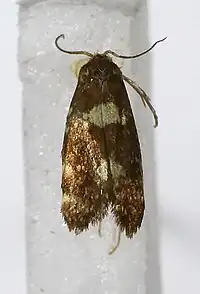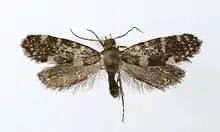Lampronia corticella
Lampronia corticella, the raspberry moth, is a moth of the family Prodoxidae. The species was first described by Carl Linnaeus in his 1758 10th edition of Systema Naturae. It is found in most of Europe, except Iceland, the Iberian Peninsula and the Balkan Peninsula. It is an introduced species in North America, where it was first detected in New Brunswick, Canada, in 1936.

| Lampronia corticella | |
|---|---|
 | |
| Scientific classification | |
| Domain: | Eukaryota |
| Kingdom: | Animalia |
| Phylum: | Arthropoda |
| Class: | Insecta |
| Order: | Lepidoptera |
| Family: | Prodoxidae |
| Genus: | Lampronia |
| Species: | L. corticella |
| Binomial name | |
| Lampronia corticella | |
| Synonyms | |
| |
The wingspan is 10–12 mm.9-12 mm. The head is light yellow-ochreous mixed with fuscous. Forewings dark fuscous, with scattered pale yellowish dots. There are four small costal and two larger dorsal pale ochreous-yellowish spots; tips of apical cilia whitish. Hindwings are dark grey. [1] The larvae feed on Rubus species.
References
- Meyrick, E., 1895 A Handbook of British Lepidoptera MacMillan, London pdf
 This article incorporates text from this source, which is in the public domain. Keys and description
This article incorporates text from this source, which is in the public domain. Keys and description
External links
- Kimber, Ian. "9.003 BF136 Raspberry Moth Lampronia corticella (Linnaeus, 1758)". UKMoths. Retrieved 1 July 2019.
- Murray, Tom (10 December 2016). "Species Lampronia corticella - Raspberry Bud Moth - Hodges#0180.1". BugGuide. Retrieved July 1, 2019.
- Swedish Moths
- Lepiforum e.V.
This article is issued from Wikipedia. The text is licensed under Creative Commons - Attribution - Sharealike. Additional terms may apply for the media files.